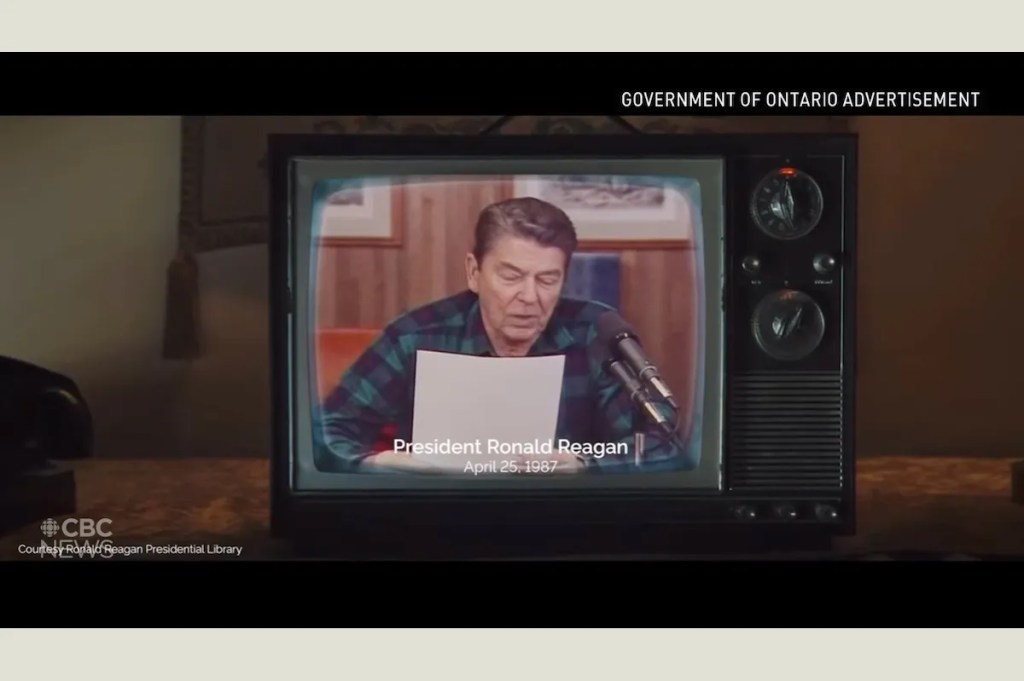The on-again, off-again relationship between Canada and the US is off-again, again.
In the latest chapter of this perpetual saga, US President Donald Trump announced on October 23 that trade negotiations between the White House and Canadian Prime Minister Mark Carney had been “terminated.” Two days later, he went back to his Truth Social account and stated, “I am increasing the Tariff on Canada by 10 percent over and above what they are paying now.” To top it all off, Trump told reporters on Monday that he won’t be meeting with Carney “for a while.”
What caused the President’s reaction? An old Ronald Reagan radio address, of all things. The Ontario government spent around $75 million creating a one-minute television ad for American networks. Parts of Reagan’s April 25, 1987 radio address on free and fair trade with Japan can be heard in the background of the advert. The reason that Ontario premier Doug Ford and his Progressive Conservative government used these audio clips was to make a point about tariffs and trade.
It’s no secret that Reagan was largely opposed to the use of tariffs and spoke out strongly against them. “High tariffs inevitably lead to retaliation by foreign countries and the triggering of fierce trade wars,” the late president said, in part. “The result is more and more tariffs, higher and higher trade barriers, and less and less competition. So, soon, because of the prices made artificially high by tariffs that subsidize inefficiency and poor management, people stop buying. Then the worst happens: markets shrink and collapse; businesses and industries shut down; and millions of people lose their jobs.”
Reagan also addressed the reality of short-term tariffs to help create a level economic playing field. “When someone says, ‘Let’s impose tariffs on foreign imports,’ it looks like they’re doing the patriotic thing by protecting American products and jobs. And sometimes, for a short while, it works – but only for a short time,” he said. “What eventually occurs is: first, homegrown industries start relying on government protection in the form of high tariffs. They stop competing and stop making the innovative management and technological changes they need to succeed in world markets.”
The Ontario government used Reagan’s exact lines from his radio address, and didn’t artificially reconstruct them. That’s fine, of course. The lingering question is why they did something so foolish in the first place.
To begin with, the placement of Reagan’s lines in his radio address were shuffled around a bit. Here’s one example. The opening of the Ontario television ad contained Reagan’s point about tariffs being used for a short time in a perceived patriotic fashion. That particular paragraph occurred in the middle of his radio address. As someone who has written columns and political speeches, I can tell you the placement of certain ideas and theories is both intentional and critical to understanding the meaning behind it. Other professional writers would tell you the same thing, if they were being honest.
More than 600 of Reagan’s radio addresses were compiled in the 2001 book Reagan in His Own Hand. They were written in pen, contained few edits and followed a particular pattern, theme and cadence. It didn’t matter if he was discussing domestic policy, foreign policy, communism, capitalism, or even Halloween and Christmas. You can see it in every line, clause, paragraph and train of thought.
Why didn’t Reagan didn’t put those ideas about tariffs up front? It was likely because he thought they weren’t as critical as other concepts. Ontario’s decision to open the ad with them changed the meaning of his radio address. That’s unacceptable in my view. It’s also part of the reason why the Ronald Reagan Presidential Foundation and Institute is so irritated with the ad and feel it “misrepresents” Reagan’s remarks, along with the fact that they weren’t contacted for permission to use the clips.
Meanwhile, the Ontario government decided to poke the bear and irritate Trump in the middle of important trade negotiations. That was pretty moronic, too.
While it’s true that the President wasn’t initially bothered by the ad, this changed over the course of a few days. It’s not the first time this has happened to Trump in his presidency, by any means. There could be several reasons the President changed his mind about the ad. Perhaps he had second thoughts after letting it stew for a few days or his advisers turned him against it. Regardless, Trump doesn’t take kindly to what he perceives as criticism or ridicule of his ideas and policies. One has to always be aware of this during a negotiation with him.
Ford heavily contributed to this situation. The Ontario premier originally employed a tough but reasonable approach in dealing with the Trump White House when the tariff battle started, but he’s gone off the rails as of late. Why? He knows that many Ontarians (and Canadians) are frustrated with Trump’s tariffs and leadership, so he thinks that it’s to his political benefit. This is in spite of his PC government being well ahead in the polls and not needing to poke the bear. Diplomacy, thy name definitely isn’t Doug Ford.
Guess what? It backfired. The Ontario ad was quickly pulled after Trump pushed back. While some political experts and Ontario ministers were quite pleased with the response and publicity, the PM was seemingly not among them. “There were a series of very detailed, very specific, very comprehensive discussions… up until the point of those ads running,” Carney told reporters at the ASEAN summit in Malaysia. What a mess that the Ontario government has made.


























Leave a Reply